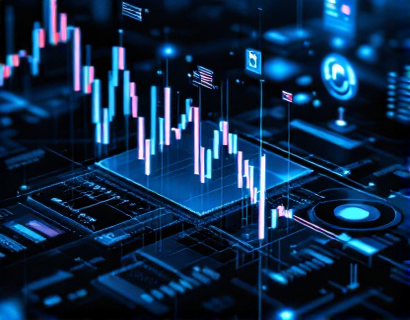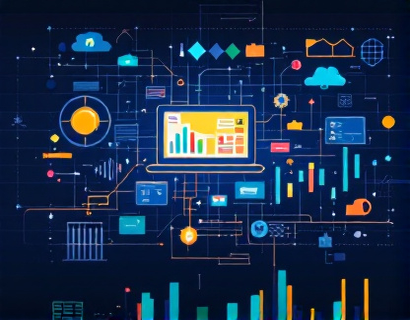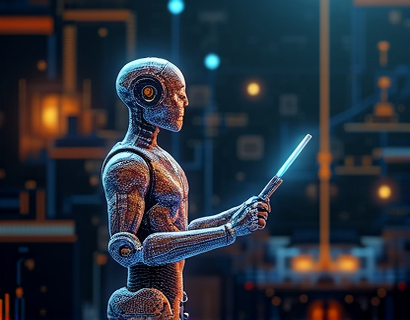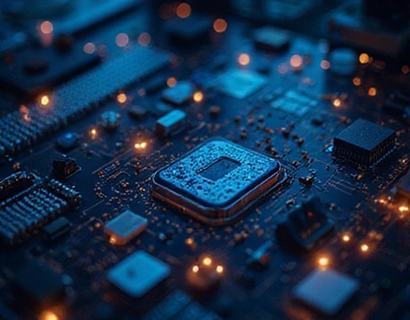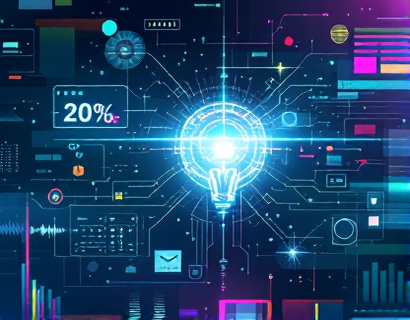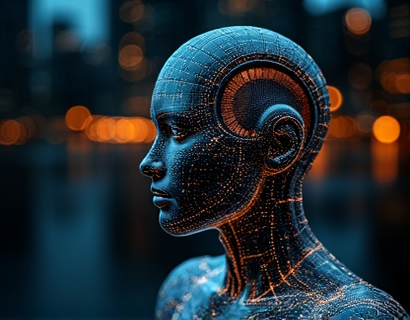The Synergy of AI and Crypto: Revolutionizing Digital Finance and Technology
The intersection of artificial intelligence (AI) and cryptocurrency is giving rise to a new era in digital finance and technology. This synergy is not just a trend but a transformative force that is redefining how we interact with financial systems and technological innovations. The integration of AI into the crypto space is unlocking unprecedented levels of efficiency, security, and user experience, setting new benchmarks across the tech and finance sectors.
AI technologies, including machine learning, natural language processing, and predictive analytics, are being harnessed to enhance various aspects of cryptocurrency and blockchain-based systems. These technologies are not only improving the performance of existing platforms but also paving the way for entirely new applications and services. This article delves into the multifaceted ways AI and crypto are combining to create innovative solutions that are reshaping the digital landscape.
Enhancing Security with AI
One of the most significant challenges in the crypto space is security. The decentralized and transparent nature of blockchain, while a strength, also makes it a prime target for cyberattacks. AI plays a crucial role in fortifying these systems against potential threats. Machine learning algorithms can analyze vast amounts of data to detect patterns and anomalies that indicate malicious activity. This proactive approach to security is far more effective than traditional methods, which often rely on predefined rules and signatures.
For instance, AI-driven security solutions can monitor blockchain transactions in real-time, identifying suspicious behavior and flagging potential fraud before it occurs. These systems can adapt and learn from new threats, continuously improving their detection capabilities. Additionally, AI can enhance the security of private keys and wallet management by implementing biometric authentication and behavioral analysis to ensure that only authorized users access sensitive information.
Optimizing Trading and Investment Decisions
The crypto market is known for its volatility and complexity, making informed trading and investment decisions crucial for success. AI is revolutionizing this aspect by providing sophisticated tools that analyze market data, news, and social media sentiment to predict price movements and identify trading opportunities. These AI-powered trading bots can execute trades at optimal times, reducing emotional bias and increasing the chances of profitable outcomes.
Moreover, AI-driven analytics platforms offer deep insights into market trends and asset performance. By processing and interpreting large datasets, these platforms can provide personalized recommendations tailored to individual investment strategies. This level of personalized insight is invaluable for both novice and experienced traders, helping them make more informed decisions and manage their portfolios more effectively.
Streamlining Smart Contract Execution
Smart contracts are self-executing contracts with the terms of the agreement directly written into code. However, the complexity of smart contract logic and the need for precise execution can pose challenges. AI is addressing these issues by enhancing the development, testing, and deployment of smart contracts. Machine learning algorithms can analyze contract code to identify potential vulnerabilities and bugs, ensuring that smart contracts function as intended and are secure from exploits.
Furthermore, AI can optimize the execution of smart contracts by predicting and adapting to changing conditions in real-time. This is particularly useful in decentralized finance (DeFi) applications, where smart contracts manage complex financial operations such as lending, borrowing, and yield farming. By leveraging AI, these processes can be made more efficient, reducing transaction costs and improving user experience.
Improving User Experience through Personalization
The crypto and finance sectors are increasingly focusing on enhancing user experience through personalization. AI technologies enable platforms to understand user preferences and behavior, allowing for tailored services and recommendations. For example, AI-driven interfaces can adapt to individual users, presenting information and tools that are most relevant to their needs and goals. This personalized approach not only improves user satisfaction but also increases engagement and retention.
Chatbots powered by natural language processing (NLP) are another key component in this area. These AI-driven assistants can provide 24/7 customer support, answering queries, and guiding users through complex processes. By understanding natural language, these chatbots can offer more intuitive and effective support, reducing the need for human intervention and enhancing the overall user experience.
Enhancing Decentralized Identities
Decentralized identities (DIDs) are a critical aspect of the crypto ecosystem, providing users with control over their personal data and online presence. AI is playing a pivotal role in the development and management of DIDs by ensuring their security and interoperability. Machine learning algorithms can analyze and verify identity attributes, reducing the risk of fraud and enhancing privacy.
AI can also facilitate the seamless integration of DIDs across different platforms and services, creating a unified and secure identity system. This interoperability is essential for the widespread adoption of decentralized technologies, as it allows users to maintain a consistent and secure identity across various digital environments.
Innovative Financial Products and Services
The synergy of AI and crypto is giving birth to innovative financial products and services that were previously unimaginable. One such example is AI-powered stablecoins, which use machine learning to maintain price stability by adjusting supply based on market conditions. These stablecoins can offer the benefits of cryptocurrencies while minimizing price volatility, making them more suitable for everyday transactions and store of value.
Another innovative application is AI-driven insurance products in the crypto space. By analyzing vast amounts of data, AI can assess risk more accurately and offer tailored insurance solutions to crypto users. This approach can provide better protection against potential losses and uncertainties, fostering greater confidence in the crypto ecosystem.
Challenges and Considerations
While the integration of AI and crypto offers numerous benefits, it also presents several challenges that need to be addressed. One of the primary concerns is the regulatory landscape. As AI and crypto continue to evolve, regulators are grappling with how to oversee these technologies to ensure compliance and protect consumers. Balancing innovation with regulation is crucial to fostering a healthy and sustainable ecosystem.
Another challenge is the technical complexity involved in integrating AI with blockchain and crypto systems. Developing robust and scalable solutions requires significant expertise and resources. Additionally, the ethical implications of AI, such as bias and transparency, must be carefully considered to build trust and ensure fair outcomes.
Future Prospects
The future of AI and crypto synergy is bright, with numerous potential developments on the horizon. As AI technologies advance, we can expect even more sophisticated tools and applications in the crypto space. For instance, the integration of AI with quantum computing could lead to breakthroughs in cryptography, enhancing the security and efficiency of blockchain networks.
Moreover, the convergence of AI, crypto, and other emerging technologies like the Internet of Things (IoT) and 5G networks will create a more interconnected and intelligent digital world. This convergence will enable new use cases and services, from smart cities to decentralized autonomous organizations (DAOs), further transforming the landscape of digital finance and technology.
In conclusion, the synergy between AI and crypto is driving significant innovation and transformation in the digital finance and technology sectors. By enhancing security, optimizing trading, streamlining smart contracts, personalizing user experiences, and creating new financial products, this partnership is setting new standards and opening up exciting possibilities. As the ecosystem continues to evolve, it is essential to address the challenges and embrace the opportunities that this powerful combination offers.




